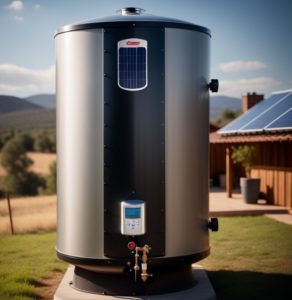Before we delve further, it is essential to understand the historical context of water purification. Historically, methods like boiling water, using sand and gravel filtration, or chemical disinfection dominated. However, these methods often required lots of resources or had environmental drawbacks. With the evolution of technology, water purification technology has also enhanced, leading us to a groundbreaking solution: solar water purification, which harnesses the sun’s power to provide clean water without the environmental cost.
What is Solar Water Purification?

Solar water purification involves using solar energy to remove contaminants from water. This process typically utilizes solar heat or ultraviolet (UV) light. The solar heat method involves using the sun’s energy to heat water to a point where harmful bacteria and viruses are destroyed. In contrast, UV purification uses solar-powered UV light to disrupt the DNA of pathogens, rendering them harmless.
Key Components
The typical portable solar water purifier consists of:
- Solar Panels: These convert sunlight into electrical energy.
- UV Light or Heat Element: This component uses electrical energy to either heat the water or emit UV light.
- Filter System: Often included to remove physical impurities before or after the disinfection process.
Advantages of Portable Solar Water Purifiers
Portable solar water purifiers offer several compelling advantages:
- Mobility: They are designed to be lightweight and easy to carry, making them ideal for remote areas or emergencies.
- Eco-Friendly: They utilize renewable energy, reducing reliance on fossil fuels and chemical treatments.
- Cost-Effective: After the initial investment, the operational costs are minimal since solar energy is free.
- Ease of Use: These systems are generally user-friendly, requiring minimal technical knowledge to operate.
Aligning with Sustainability and Green Practices

Contribution to Sustainable Living
Portable solar water purifiers align perfectly with the principles of sustainable living. They offer a pollution-free method of water purification thus reducing the environmental footprint. Compared to traditional methods that often involve chemicals or require significant energy from non-renewable sources, they are far better.
Impact on Global Health
By providing access to clean, safe drinking water, these devices significantly impact global health, particularly in underdeveloped regions. They help reduce the prevalence of waterborne diseases, which are a major health issue in many parts of the world.
Economic Benefits
In addition to health benefits, there is an economic impact. Communities spend less on healthcare for waterborne illnesses, and individuals can devote more time to work or education instead of collecting and purifying water.
Conclusion: The Path Forward
The development of portable solar water purifiers represents a significant step forward in the quest for universal access to clean water. As technology advances and becomes more accessible, these devices are likely to play a crucial role in not only improving health but also promoting sustainable practices worldwide. This technology is not just a tool for survival but a bridge towards a more sustainable and healthy future.





